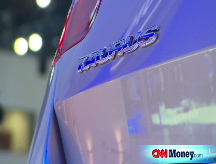Auto sales worst in 26 years
January sales tumble more than expected at GM, Ford and Toyota as rental car companies slash purchases.
 |
| Automakers across the industry reported sharply lower sales in January, as rental car companies pulled way back on purchases and consumer demand stayed weak. |
NEW YORK (CNNMoney.com) -- Auto sales tumbled 38% in January, plunging even more than expected to their worst levels since 1982 as a pullback in purchases by rental car companies became the latest problem for the troubled industry.
General Motors (GM, Fortune 500) reported that its sales plunged 49% from a year ago. Ford Motor (F, Fortune 500) said sales fell 39% at its Ford, Lincoln and Mercury brands, and 40% overall when including sales at Volvo, which Ford is trying to sell. Chrysler LLC reported a 55% drop in sales.
But it wasn't just the U.S. automakers reporting sharply lower sales. Toyota Motor (TM) reported a 32% decrease in its U.S. sales, while sales at Honda Motor (HMC) tumbled 28%. Nissan (NSANY) sales fell 30%.
"We are facing unprecedented times in the industry, and no auto company is immune from current market conditions," said Dick Colliver, executive vice president of sales for American Honda, in a statement.
The sales results were all worse than forecasts from sales tracker Edmunds.com, which had predicted that GM's sales would tumble 38%, along with a 30% drop at Ford and a 48% plunge at Chrysler. It had also forecast a 25% decline at Toyota, a 23% drop at Honda and a 28% decrease at Nissan.
Overall, Edmunds.com was expecting a 30% decline in year-over-year sales for the industry
Sales tracker Autodata said the seasonally-adjusted annual sales rate, or SAAR, fell to 9.6 million from 15.4 million a year earlier. That is the first time it has been below the 10 million mark in more than 26 years. GM's director of sales analysis Mike DiGiovanni said that January will mark the first month on record that auto sales in the United States trailed sales in China.
The dismal January sales, which were down 27% from December, are an indication that the problems that almost drove GM and Chrysler into bankruptcy last month show little signs of letting up.
Executives at all three U.S. automakers said the decline was due primarily to significantly lower fleet sales to large business customers, such as rental car companies.
The plunge in demand for travel and rental cars caused leading companies such as Enterprise and former Ford unit Hertz (HTZ, Fortune 500) to pull back on their purchases last month.
As recently as December, fleet sales made up 22% of total industry sales, said George Pipas, Ford's director of sales analysis. But he added that industrywide fleet sales plunged 65% to 70% in January from year-ago levels, and that they would account for no more than 12% of total industry sales in January.
GM said its fleet sales fell 80% in the month, and that only 1,000 cars out of 12,000 total fleet sales went to rental companies. Chrysler reported a 81% drop in fleet sales, and Ford's fleet sales were off 65% in January.
Chrysler Vice Chairman Jim Press said during a conference call that Chrysler deliberately moved away from fleet sales to concentrate on sales to consumers, which is more profitable. He said it is better to shut plant capacity than keep them running to supply the rental industry.
"It's much healthier to have good, retail sales," he said.
But Mark LaNeve, vice president of sales for GM North America, said that while GM has also been backing away from fleet sales in recent years, it is looking for any sales in this environment.
"We'll take all the [fleet] volume we can get," said LaNeve. "We're aggressively going after it."
The pain wasn't just in fleet sales though. GM reported a 38% drop in retail sales, while Chrysler retail sales fell 35%. Ford reported that retail sales were down 27% from a year earlier. GM's sales' woes were widespread; out of nearly 100 models, virtually all posted double-digit percentage declines in sales.
GM said that its former finance arm, GMAC, started making more car loans during January after it was granted bank holding company status and received $6 billion in federal funds directed to helping the nation's banks. GMAC provided little financing for GM buyers during the fourth quarter.
"We did get GMAC back in the game," LaNeve said. "We think that bodes well for February and beyond."
But LaNeve said GMAC still provided financing on only about 5,000 vehicles during the month, or less than 5% of its sales, well off of the more than 50% of GM sales it used to finance.
Beyond the credit squeeze, weak consumer confidence also hit sales in the month, according to Jesse Toprak, executive director of industry analysis for Edmunds.com.
He said he doesn't expect sales in the coming months to improve significantly as long as there are so many worries about job losses and the overall economy. People are likely to hang on to their older cars instead of buying new ones.
"A lot of consumers are realizing what they have now is good enough until the dust settles," he said.
Still, Korean automaker Hyundai, which is offering buyers a chance to return a car to the automaker should they lose their jobs, bucked the trend in January. Hyundai sales were up 14% from year ago levels.
"They may have hit a chord," Toprak said. "That may be the new creative way to go for automakers in terms of promotion." ![]()


